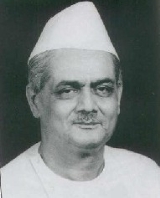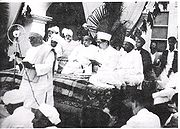
Ganesh Vasudev Mavlankar
Encyclopedia
Ganesh Vasudev Mavalankar (November 27, 1888–27 February 1956) popularly known as Dadasaheb was an independence activist, the President (from 1946 to 1947) of the Central Legislative Assembly
, then Speaker of the Constituent Assembly of India
, and later the first Speaker of the Lok Sabha
, the lower house of the Parliament of India
.
 Mavalankar hailed from a Marathi
Mavalankar hailed from a Marathi
family but lived and worked in Ahmedabad
, capital of Gujarat. His family originally belonged to Mavalange in Ratnagiri district
of Bombay Presidency
in British India. After his early education in Rajapur
and other places in Bombay Presidency, Mavalankar moved to Ahmedabad in 1902 for higher studies. He obtained his B.A. Degree in Science from the Gujarat College
, Ahmedabad, in 1908. He was a Dakshina Fellow of the College for one year in 1909 before beginning his law studies in Government Law School, Bombay. He passed his Law examination in First Class in 1912 and entered the legal profession in 1913. Soon. he came into contact with eminent leaders like Sardar Vallabhbhai Patel
and Mahatma Gandhi
. He became the honorary secretary of the Gujarat Education Society in 1913 and the secretary of the Gujarat Sabha in 1916. Mavalankar was elected to the Ahmedabad Municipality for the first time in 1919. He was a member of the Ahmedabad Municipality during 1919-22, 1925–28, 1930–33 and 1934-37.
with the Non-Cooperation Movement
. He was appointed secretary of the Gujarat Provincial Congress Committee during 1921-22. Although he temporarily joined the Swaraj Party
in the 1920s, he returned to Mahatma Gandhi
and the Salt Satyagraha
in 1930. After the Congress abandoned its boycott
of elections to the pre-independence legislative councils in 1934, Mavlankar was elected to the Bombay Province Legislative Assembly and became its Speaker in 1937. Mavalankar remained Speaker of the Bombay Legislative Assembly from 1937 to 1946. In 1946, he was elected also to the Central Legislative Assembly
.
Mavalankar remained the President of the Central Legislative Assembly till the midnight of August 14–15, 1947 when, under the Indian Independence Act 1947
, the Central Legislative Assembly and the Council of States ceased to exist and the Constituent Assembly of India
assumed full powers for the governance of India. Just after independence, Mavalankar headed a committee constituted on August 20, 1947 to study and report on the need to separate the Constitution-making role of the Constituent Assembly from its legislative role. Later, on the basis of this Committee's recommendation, the legislative and Constitution-making roles of the Assembly were separated and it was decided to have a Speaker to preside over the Assembly when during its functioning as the legislative body. Mavalankar was elected to the office of speaker of the Constituent Assembly (Legislative) on 17 November 1947. With the adoption of the Constitution of India
on November 26, 1949, the nomenclature of the Constituent Assembly (Legislative) was changed to the Provisional Parliament. Mavalankar became the Speaker of the Provisional Parliament on November 26, 1949 and continued to occupy the office till the 1st Lok Sabha
was constituted in 1952.
On May 15, 1952, after the first general elections in independent India, Mavalankar was elected the Speaker of the 1st Lok Sabha. The House carried the proposal with 394 votes, against the opponent's 55. In January 1956, Mavalankar suffered a cardiac arrest and died on February 27, 1956 in Ahmedabad.
Central Legislative Assembly
The Central Legislative Assembly was a legislature for India created by the Government of India Act 1919 from the former Imperial Legislative Council, implementing the Montagu-Chelmsford Reforms...
, then Speaker of the Constituent Assembly of India
Constituent Assembly of India
The Constituent Assembly of India was elected to write the Constitution of India, and following independence served as the nation's first Parliament.-Nature of the Assembly:...
, and later the first Speaker of the Lok Sabha
Lok Sabha
The Lok Sabha or House of the People is the lower house of the Parliament of India. Members of the Lok Sabha are elected by direct election under universal adult suffrage. As of 2009, there have been fifteen Lok Sabhas elected by the people of India...
, the lower house of the Parliament of India
Parliament of India
The Parliament of India is the supreme legislative body in India. Founded in 1919, the Parliament alone possesses legislative supremacy and thereby ultimate power over all political bodies in India. The Parliament of India comprises the President and the two Houses, Lok Sabha and Rajya Sabha...
.
Early life

Marathi people
The Marathi people or Maharashtrians are an Indo-Aryan ethnic group, that inhabit the Maharashtra region and state of western India. Their language Marathi is part of the southern group of Indo-Aryan languages...
family but lived and worked in Ahmedabad
Ahmedabad
Ahmedabad also known as Karnavati is the largest city in Gujarat, India. It is the former capital of Gujarat and is also the judicial capital of Gujarat as the Gujarat High Court has its seat in Ahmedabad...
, capital of Gujarat. His family originally belonged to Mavalange in Ratnagiri district
Ratnagiri District
Ratnagiri district is one of the 35 districts of Maharashtra state in western India. Ratnagiri is the district headquarters of the district. The district is 11.33% urban. The district is bounded by the Arabian Sea to the west, Sindhudurg district to the south, Raigad district to the north and...
of Bombay Presidency
Bombay Presidency
The Bombay Presidency was a province of British India. It was established in the 17th century as a trading post for the English East India Company, but later grew to encompass much of western and central India, as well as parts of post-partition Pakistan and the Arabian Peninsula.At its greatest...
in British India. After his early education in Rajapur
Rajapur
Rajapur is a city and a municipal council in Ratnagiri district in the Indian state of Maharashtra.-Geography:Rajapur is located at . It has an average elevation of 72 metres .-Demographics:...
and other places in Bombay Presidency, Mavalankar moved to Ahmedabad in 1902 for higher studies. He obtained his B.A. Degree in Science from the Gujarat College
Gujarat University
The Gujarat University is the statewide institution affiliating many reputed colleges across the state of Gujarat, India. It has been given a B++ ranking by National Assessment and Accreditation Council .-History:...
, Ahmedabad, in 1908. He was a Dakshina Fellow of the College for one year in 1909 before beginning his law studies in Government Law School, Bombay. He passed his Law examination in First Class in 1912 and entered the legal profession in 1913. Soon. he came into contact with eminent leaders like Sardar Vallabhbhai Patel
Sardar Vallabhbhai Patel
Vallabhbhai Jhaverbhai Patel was an Indian barrister and statesman, one of the leaders of the Indian National Congress and one of the founding fathers of India...
and Mahatma Gandhi
Mahatma Gandhi
Mohandas Karamchand Gandhi , pronounced . 2 October 1869 – 30 January 1948) was the pre-eminent political and ideological leader of India during the Indian independence movement...
. He became the honorary secretary of the Gujarat Education Society in 1913 and the secretary of the Gujarat Sabha in 1916. Mavalankar was elected to the Ahmedabad Municipality for the first time in 1919. He was a member of the Ahmedabad Municipality during 1919-22, 1925–28, 1930–33 and 1934-37.
Political Life
Mavalankar joined the Indian Independence MovementIndian independence movement
The term Indian independence movement encompasses a wide area of political organisations, philosophies, and movements which had the common aim of ending first British East India Company rule, and then British imperial authority, in parts of South Asia...
with the Non-Cooperation Movement
Non-cooperation movement
The non-cooperation movement was a significant phase of the Indian struggle for freedom from British rule which lasted for years. This movement, which lasted from September 1920 to February 1922 and was led by Mohandas Gandhi, and supported by the Indian National Congress. It aimed to resist...
. He was appointed secretary of the Gujarat Provincial Congress Committee during 1921-22. Although he temporarily joined the Swaraj Party
Swaraj Party
The Swaraj Party, Swarajaya Party or Swarajya Party, established as the Congress-Khilafat Swarajaya Party, was a political party formed in India in 1922 that sought greater self-government and political freedoms for the Indian people from the British Raj. It was inspired by the concept of Swaraj...
in the 1920s, he returned to Mahatma Gandhi
Mahatma Gandhi
Mohandas Karamchand Gandhi , pronounced . 2 October 1869 – 30 January 1948) was the pre-eminent political and ideological leader of India during the Indian independence movement...
and the Salt Satyagraha
Salt Satyagraha
The Salt March, also known as the Salt Satyagrahah began with the Dandi March on March 12, 1930, and was an important part of the Indian independence movement. It was a campaign of tax resistance and nonviolent protest against the British salt monopoly in colonial India, and triggered the wider...
in 1930. After the Congress abandoned its boycott
Boycott
A boycott is an act of voluntarily abstaining from using, buying, or dealing with a person, organization, or country as an expression of protest, usually for political reasons...
of elections to the pre-independence legislative councils in 1934, Mavlankar was elected to the Bombay Province Legislative Assembly and became its Speaker in 1937. Mavalankar remained Speaker of the Bombay Legislative Assembly from 1937 to 1946. In 1946, he was elected also to the Central Legislative Assembly
Central Legislative Assembly
The Central Legislative Assembly was a legislature for India created by the Government of India Act 1919 from the former Imperial Legislative Council, implementing the Montagu-Chelmsford Reforms...
.
Mavalankar remained the President of the Central Legislative Assembly till the midnight of August 14–15, 1947 when, under the Indian Independence Act 1947
Indian Independence Act 1947
The Indian Independence Act 1947 was as an Act of the Parliament of the United Kingdom that partitioned British India into the two new independent dominions of India and Pakistan...
, the Central Legislative Assembly and the Council of States ceased to exist and the Constituent Assembly of India
Constituent Assembly of India
The Constituent Assembly of India was elected to write the Constitution of India, and following independence served as the nation's first Parliament.-Nature of the Assembly:...
assumed full powers for the governance of India. Just after independence, Mavalankar headed a committee constituted on August 20, 1947 to study and report on the need to separate the Constitution-making role of the Constituent Assembly from its legislative role. Later, on the basis of this Committee's recommendation, the legislative and Constitution-making roles of the Assembly were separated and it was decided to have a Speaker to preside over the Assembly when during its functioning as the legislative body. Mavalankar was elected to the office of speaker of the Constituent Assembly (Legislative) on 17 November 1947. With the adoption of the Constitution of India
Constitution of India
The Constitution of India is the supreme law of India. It lays down the framework defining fundamental political principles, establishes the structure, procedures, powers, and duties of government institutions, and sets out fundamental rights, directive principles, and the duties of citizens...
on November 26, 1949, the nomenclature of the Constituent Assembly (Legislative) was changed to the Provisional Parliament. Mavalankar became the Speaker of the Provisional Parliament on November 26, 1949 and continued to occupy the office till the 1st Lok Sabha
1st Lok Sabha
The First Lok Sabha was constituted on 17 April 1952 after India's first general election. The 1st Lok Sabha lasted its full tenure of five years and was dissolved on 4 April 1957.- Important Members :- List of Members by state :...
was constituted in 1952.
On May 15, 1952, after the first general elections in independent India, Mavalankar was elected the Speaker of the 1st Lok Sabha. The House carried the proposal with 394 votes, against the opponent's 55. In January 1956, Mavalankar suffered a cardiac arrest and died on February 27, 1956 in Ahmedabad.

